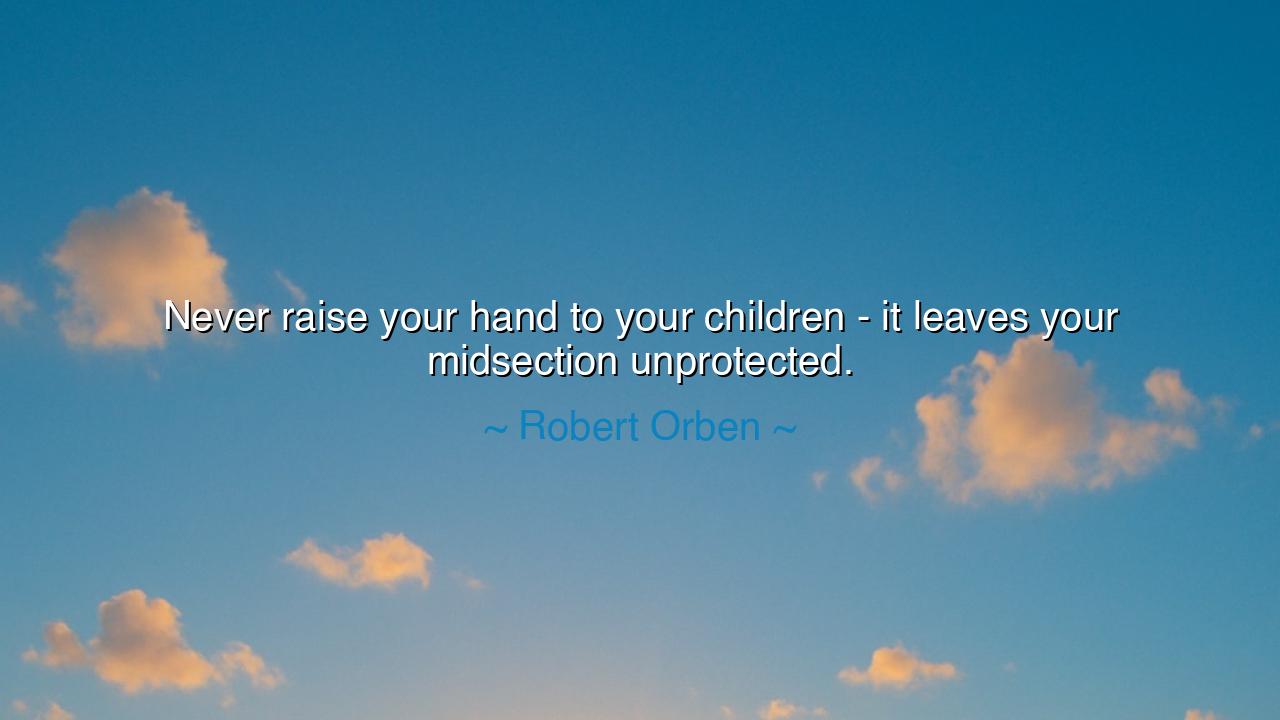
Never raise your hand to your children - it leaves your






Robert Orben, with wit sharpened like the blade of an elder scribe, once declared: “Never raise your hand to your children—it leaves your midsection unprotected.” On the surface, his words sparkle with humor, but beneath the laughter lies a profound reflection on parenting, discipline, and the futility of violence. His jest is a mirror, showing us that the act of striking a child is not only unwise but also exposes the parent to weakness—physical, moral, and spiritual.
In the tongue of comedy, Orben unveils a truth ancient as time: that to rule by fear is to be undone by it. For when a hand is lifted in anger, the heart is lowered in wisdom. The parent who chooses force may think themselves strong, yet in truth they are left unprotected, for they weaken the sacred bond of trust. Children may obey out of fear, but fear does not plant the seeds of respect; it plants resentment, silence, and rebellion that will bloom in time.
The ancients understood this lesson well. Consider the writings of Quintilian, the Roman teacher of rhetoric, who warned against striking students, declaring that harshness deadens the spirit of learning. Instead, he urged the path of guidance, encouragement, and patience. His counsel echoes Orben’s in another form: the teacher or parent who strikes loses more than they gain, for the soul of the child recoils. The hand lifted in punishment leaves the heart unguarded.
History offers us real-life proof. Frederick Douglass, in his memoir, told of the moment his grandmother, who had once raised him with tenderness, delivered him to harsh masters. The blows he received from those who claimed authority did not teach him loyalty—they taught him the depths of cruelty. Yet it was the memory of kindness, of gentle guidance, that fueled his lifelong fight for justice. Violence wounded, but love fortified. Orben’s jest, then, is an echo of a greater truth: gentleness is strength; cruelty is weakness disguised.
In Orben’s humor also lies a lesson in human nature. Children are not passive vessels but living spirits, quick to resist when struck unjustly. The image of leaving the midsection unprotected is not merely about physical retaliation—it is symbolic. It speaks to the vulnerability that arises when a parent abandons wisdom for anger. The center of the family, the very heart of unity, is left exposed. Once wounded, it is not easily healed.
The teaching for future generations is clear: never raise the hand, but raise instead the voice of reason, the example of character, and the embrace of guidance. If discipline must be given, let it be in words that correct without crushing, in actions that shape without shaming. True authority is not in the strength of the arm, but in the strength of consistency, patience, and love.
Practical action follows from this truth: parents, hold your temper as you would hold a sword, carefully and with restraint. When anger rises, step away. When correction is needed, speak with firmness but without cruelty. Remember always that children mirror what they see: if they see violence, they will repeat it; if they see wisdom, they will aspire to it. In this way, you guard not only your household but also the generations to come.
Thus, Orben’s playful words, draped in laughter, carry the gravity of an ancient command: do not strike, for in striking you wound yourself as well. Protect your center—your heart, your family’s bond, your child’s spirit—by choosing patience over anger, guidance over blows, and love over fear. For this is the path that leads not to fleeting obedience, but to lasting respect and unbreakable trust.






AAdministratorAdministrator
Welcome, honored guests. Please leave a comment, we will respond soon